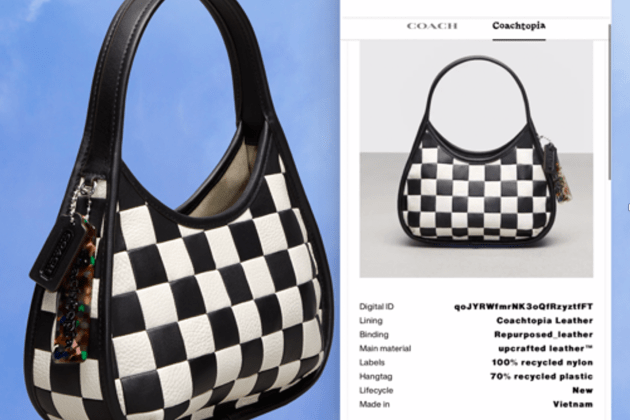Digital Product Passports Offer More Than Just Impact and Compliance Info

If adopted into law, a host of legislation under consideration in the EU right now would require that all products have a digital product passport (DPP). This end-to-end traceability across a product’s entire lifecycle would provide a new level of transparency throughout the fashion industry, storing provenance information and impact data for a product throughout its entire life cycle.
But while policy compliance will surely be the major impetus for the fashion industry to adopt DPPs and transparency initiatives, it shouldn’t be the only reason.
More from WWD
Zero10 Brings Web Widget, Generative AI for Virtual Fashion Try-ons
Balmain Collab Brings Art, AI, Personalization to Unicorn Kicks
Cloud-based digital ID platform Eon, a New York-based software-as-a-service (SaaS) company that has been beating the drum for a more connected fashion industry, sees broader implications beyond future-proofing a business for regulations.
“The Eon platform was designed to enable end-to-end product traceability through item-level digital IDs, but we are finding that there are limitless possibilities and digital ID technology offers brands a blank canvas for consumer engagement,” says Eon Founder and CEO Natasha Franck.
Eon technology makes products interactive and unlocks a host of post-purchase consumer-engagement features and applications, she continued. “Brands can use digital IDs as a new media channel to serve customers all kinds of rich media experiences, video and audio content and exclusive offers. We’re confident that our partner brands will continue to leverage our technology to deliver unique, personalized customer experiences that extend their brand storytelling and engagement in new ways.”
Balenciaga Music, for example, recently used Eon’s technology to create “connected tech” garments with embedded music, answering the question: can style have a soundtrack?
The fashion house embedded a song commissioned from London-based trip-hop group Archive into a capsule collection of Ts and hoodies. To unlock the 8.5-minute exclusive track called “Patterns,” wearers could scan their phone over the near-field communication (NFC) chip embedded within sewn-in tags. The encrypted song couldn’t be shared or accessed via streaming channels, making it exclusive to Balenciaga.
Balenciaga Music already curates mixes, like its Fitting Rooms Playlist (with songs from Sade to Radiohead) available on various music streaming services, but song-embedded items broke new tech ground for the company.
“On the consumer side, fun and creative interactive experiences like exclusive music offers can definitely serve as an entryway into other experiences and learning about an item’s provenance, materials and lifecycle, encouraging consumers to participate in a more circular fashion economy,” said Franck.
The benefits also carry into the resale and circular economy.
Before digital IDs, once a product was sold the first time, the brand’s original relationship to it was lost. Once DPPs are universally adopted —unlocking connections that remain intact over time — items that are recycled, upcycled, repurposed, resold or rented will retain their digital information. This doesn’t just make good branding sense, it makes business sense.
“For so long in fashion, we’ve had a business model just based on volume. Now we can actually look at brands monetizing products with second and third lives, which will incentivize and build a new revenue stream for brands,” says Franck. “This is incredibly powerful and brings together that 360 vision.”
Fashion luxury house Coach has been an early adopter of digital IDs, leveraging Eon’s enterprise tech to drive deeper customer relationships, support sustainability goals and increase product value for its line of circular Coachtopia products through new services. This has built the foundation for a circular business model transformation, in addition to complying with DPP regulations.
In the webinar “Digital Product Passports: Shaping the Future of Commerce,” Joon Silverstein, Coach senior vice president of global marketing, creative and sustainability and head of Coachtopia, outlined the three main ways how Coach is using Eon-enabled connected products to deliver richer consumer experiences.
First, data-driven transparency. “We’ve learned from our Gen Z community that they want brands to be more open and honest about their sustainability efforts, to not only share intents but [to share] quantifiable impacts and to bring [consumers] along on the journey,” she said.
Second, facilitating circular product journeys. “One of Coachtopia’s core circularity principles is to design each product for multiple lives, so it can be more easily repaired, disassembled, remade, recycled for second and even third life, and to scale the circular pathway so our products can stay in use and out of landfill,” she said. “Digital passports are critical and that they provide the means to facilitate and follow each products journey.”
Third, community engagement beyond the point of sale, which is especially important for a company that wants to “build long-term relationships, not just sell products.” Customers can connect the product’s digital passport to their account, then access a range of circular services that will help prolong the lifespan of their product. This connection is possible regardless of where the customer buys the product.
Rich storytelling also goes a long way, especially with younger consumers, and digital IDs are another way to facilitate this. “Can you imagine at some point when you buy a second life [Coachtopia] product, scan it and find out that your crossbody bag used to be a tote in its first life?” said Silverstein. “Gen Z really craves that story connection.”
Best of WWD
